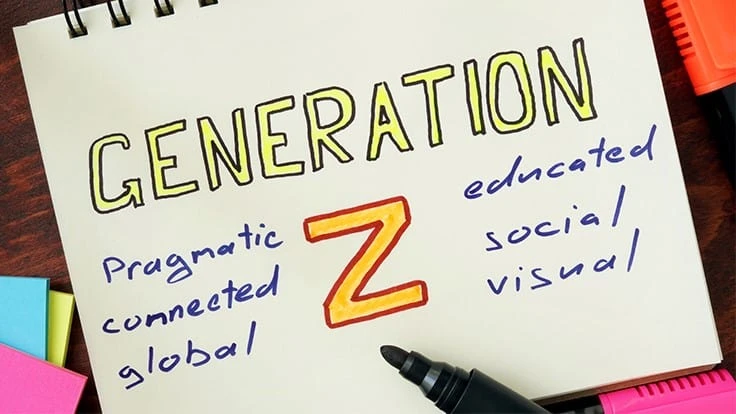
Adobe Stock
One of my first jobs was as a part-time helper on the crew at the local golf club in my hometown. I spent four hours every weekday during the summer of 2015, picking the driving range clean, washing the range balls and restocking them in the giant bucket we had sitting in the pro shop.
It was nothing glamorous and the pay wasn’t fantastic, but as a 15-year-old kid, I was content enough to return for every summer until I left for college. Why? Because through the four summers I worked at that golf club, my bosses worked with me to create a job I enjoyed working at.
As the newest flock of teenagers and young adults like myself flow into the workforce one by one, many younger employees are now identifying as members of Gen Z, the generation born somewhere between the late 1990s up until the early 2010s. They’re the first “digital generation,” and as such have developed a unique identity in the past few years as they’ve come into young adulthood.
In an attempt to connect veterans of the industry with their younger employees, I’ve identified several key points I believe any superintendent or general manager might find useful as they begin to hire workers that increasingly identify with Gen Z.
1. Keep it simple
Gen Z are, for the most part, direct in conversation and hate circling around a topic. Conversations must have a point and get to it quickly, or they’ll tune out. The age of social media has hardwired young people’s heads to wanting to-the-point information as fast as possible so they can carry on with their work.
You don’t need to overcomplicate or overexplain what needs to be done. Keep the explanation as short as possible or you’ll risk losing their attention. Think of it like composing a tweet— if it seems longer than it needs to be, trim it down.
It’s essentially speaking in shorthand. Youngins are smart, and they’ll ask for clarification where they need it.
2. Don’t put them on a tight leash all the time
Many of my peers spend much of their time chaffing against the powers that be at our jobs and how some of our bosses “just won’t get off our backs.” We’re not a unique generation for saying this, it’s been a common complaint since the advent of the workplace.
There’s always points on the job when time is of the essence, like when the day begins and mowing must be completed ahead of play. But when the workflow slows and the crew can alter its pace, that’s when you can let them work more independently.
As young as they are, much of Gen Z is still going through its phase of wanting to be independent while still largely depending on superiors and authority figures for help.
3. Be honest about the job
One common frustration I hear from many of my peers when they begin a new job is the pay. Not in the “I should be getting paid more” way, but in the “they said I could be making this hourly rate, but instead I’m making far less” way. Plenty of people my age working jobs over the summer or beginning a new job aren’t complaining that the pay is lousy, but rather that the potential pay overshadowed what they’d actually make. It’s a technicality, and Gen Z hates technicalities.
If you are offering a job, let the person applying know what they’ll be making. The honesty is what makes the interviewee excited for the job and helps prepare them for the work environment.
4. Flexibility
We’ve beaten this point to death with a stick, but it still stands — Gen Z is young. They’re young and want to have a job that’s available to be flexible alongside with their schedules. A lot of personal schedules nowadays are unpredictable, and even outside the expected, something unpredictable is bound to happen. Whether it be a car malfunction, unexpected illness or a family emergency, life is hard to fully control.
Aside from the unexpected, the out-of-work vacation is vital to the younger workers. Many of my peers feel that when putting in time for vacation, they’re often ignored or deemed less needing of it.
5. Show there’s an alternative to college debt
Nowadays, somewhere around 60 percent of college-aged Gen Z members are currently attending college, a rate higher than even the millennials who came before us. Alongside this rise in college attendance, the debate about the cost of higher education has also come back into the limelight. Many in Gen Z are turned off by the prospect of going into debt simply to earn a degree.
What’s the solution? Show them the alternative. A job in the golf industry can pay off better and be just as fulfilling as a college degree, and often some colleges offering associate’s degrees in turf management are subsidized, meaning the cost of college is even lower. Young workers want a job that pays well, but also want the college experience. If the option is available, why not both?
Jack Gleckler is an Ohio University senior participating in the Golf Course Industry summer internship program.
Get curated news on YOUR industry.
Enter your email to receive our newsletters.Latest from Golf Course Industry
- Atlanta Athletic Club approves funding for master plan
- PBI-Gordon introduces new field development team
- The Cabot Collection announces move into course management
- Carolinas GCSA raises nearly $300,000 for research
- Advanced Turf Solutions’ Scott Lund expands role
- South Carolina’s Tidewater Golf Club completes renovation project
- SePRO to host webinar on plant growth regulators
- Turfco introduces riding applicator






